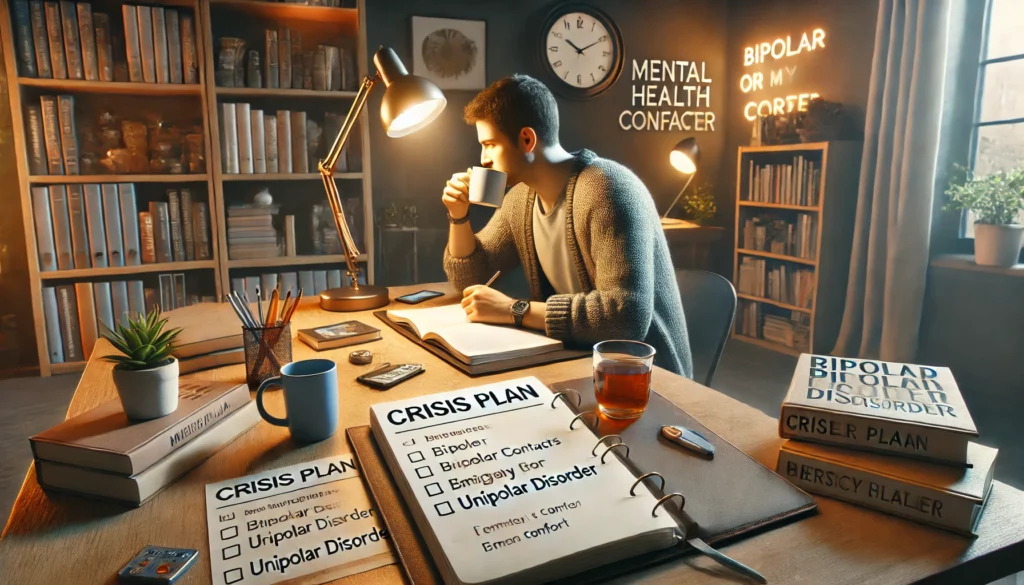
1️⃣ Introduction
People living with bipolar or unipolar disorder often experience difficult phases that challenge their emotional stability. Crises can arise unexpectedly and significantly impact daily life. A personalized crisis plan can help recognize symptoms early, ensure self-protection, and implement appropriate measures to navigate challenging times more effectively.
2️⃣ Why Is a Crisis Plan Important?
A well-structured crisis plan provides security and guidance during difficult phases. The benefits include:
- Early detection of symptoms to prevent severe episodes
- Improved self-control through structured routines and clear strategies
- Reduction of stress and anxiety
- Support from the social environment with defined action steps
- Minimization of risks (e.g., self-harm or social isolation)
3️⃣ Components of a Crisis Plan
An effective crisis plan should include various elements to ensure optimal self-preparation.
🔍 1. Recognizing Early Warning Signs
Every crisis is often preceded by subtle changes. Recognizing these early can help mitigate the severity of an episode.
Early Warning Signs of a Depressive Episode:
- 🟩 Fatigue, lack of motivation
- 🟩 Withdrawal from social contacts
- 🟩 Low mood, hopelessness
- 🟩 Difficulty concentrating
- 🟩 Changes in sleep or eating habits
- 🟩 Suicidal thoughts or self-doubt
Early Warning Signs of a Manic/Hypomanic Episode:
- 🟩 Excessive energy, little to no sleep
- 🟩 Racing thoughts, pressured speech
- 🟩 Impulsive or risky behavior (e.g., excessive spending, reckless driving)
- 🟩 Inflated self-esteem or grandiosity
- 🟩 Restlessness, inability to relax
📋 2. Establishing Emergency Contacts
Having important contacts readily available is essential:
- Psychiatrist/Therapist
- Emergency psychiatric services
- Trusted contacts (friends, family, caregivers)
- Crisis hotlines and mental health support services
🏠 3. Safety Measures and Protection Strategies
- Preventing self-harm: Keep medications, sharp objects, or other potentially harmful items out of immediate reach.
- Self-soothing strategies: Create a safe space with relaxing activities (e.g., meditation, walks in nature, listening to music).
- Daily routine: Maintaining a structured schedule (regular sleep, meals, and social activities) helps maintain stability.
🗣️ 4. Communication Plan with Relatives and Professionals
- Designate a trusted person to be informed if a crisis is approaching.
- Set up a code word or signal to notify loved ones when help is needed.
- Open discussions: Clearly communicate expectations and ways others can provide support.
💊 5. Medication Management
- Ensure regular medication intake (consult a doctor as needed).
- Keep emergency medication available (if prescribed by a doctor).
- Do not stop medication abruptly without medical supervision.
🚨 6. Steps to Take During an Acute Crisis
If the situation escalates or becomes dangerous:
- Seek immediate professional help (call emergency services or a psychiatric crisis team).
- Avoid isolation—reach out to a trusted person.
- Refrain from alcohol or drugs, as they can worsen the crisis.
- Consider hospitalization if no other solution is effective.
7️⃣ Self-Care During and After a Crisis
- Schedule relaxation time: Use meditation, yoga, or breathing exercises.
- Keep a journal to recognize patterns and improve coping strategies.
- Reward small achievements to reinforce positive behaviors.
- Gradually reintegrate into daily life after a severe episode.
8️⃣ Conclusion
A personal crisis plan is a valuable tool for effectively managing difficult phases of bipolar or unipolar disorder. By recognizing early warning signs, establishing emergency strategies, and prioritizing self-care, individuals can work toward greater stability and long-term well-being. Reviewing and updating the plan regularly ensures better preparedness for future crises.